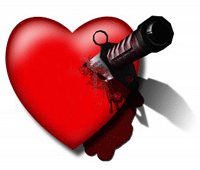never beat within a human breast"
- Lord Byron
1957-2010
With and Without
Heartache, heartbreak. Anyone who has lost a love - whether through death or rejection - knows full well what it feels like. It hurts - in a psychological, emotional AND physical way.
 One widow described the pain thus: as if someone is sticking a knife in your guts and twisting it. (In desperation, I asked if the pain subsided with time. She told me that after a year, the knife stabbing sensatiosn persisted, but sans the twisting.)
One widow described the pain thus: as if someone is sticking a knife in your guts and twisting it. (In desperation, I asked if the pain subsided with time. She told me that after a year, the knife stabbing sensatiosn persisted, but sans the twisting.)
In addition to the pain, I noticed that after Doug died, I lost my appetite for several months. This was new to me - the only other time it happened was when I had pneumonia and could barely move. (Unfortunately my appetite eventually returned in force.)
Also, one of the typical stages of grief is (appropriate) depression. Depression is typically associated with changes in brain chemistry, including serotonin levels.
Inability to sleep is another common "side effect" of loss. Sleep disturbance and anxiety can be associated with neurotransmitters such as cortisol.
I also suddenly went into menopause, which wreaked havoc on my hormones, triggering miserable hot flashes.
The scientist in me wondered if these sensations and changes could be associated with neurotransmitters. A respected naturopath told me that changes I expecienced in appetite and sleep (along with cravings for salt and intense feelings of cold) can be associated with "adrenal exhaustion." This diagnosis, which is not typically accepted in traditional medicine, assumes that adrenal glands malfunction (e.g., after a major stressor) and fail to produce healthy levels of chemicals the body and brain need to function.
Then I wondered if anyone had ever tested brain biochemistry for cortisol, dopamine, etc. in a recently bereaved person - especially someone who experienced sudden, traumatic loss. My guess is that they would see dramatic changes. (Of course, it would be useful to have a pre-loss baseline, which is unlikely to be available.)
Then I read about a University of Michigan study (published in the Journal of Neurophysiology) that looked at brain activity (using a functional MRI) in students who had recently been dumped, but said they were still intensely in love. Here is what the study concluded, (according to a summary on scienceagogo.com, by Kate Melville on 07/07/2010):
"The pain and anguish of rejection by a romantic partner trigger activity in the parts of the brain associated with motivation, reward and addiction cravings...." [The researchers equated love to addiction, in the sense that it was hard to control. This could explain why many grieving people turn to other addictions like drugs and alcohol. Or to obsessive behavior like endless blogging :-)]
"The researchers found that looking at photographs of the [15] participants' former partners stimulated several key areas of the participants' brains more than looking at photos of neutral persons did. The areas are:
- The ventral tegmental area in the mid-brain, which controls motivation and reward and is known to be involved in feelings of romantic love.
- The nucleus accumbens and orbitofrontal/prefrontal cortex, which are associated with craving and addiction, specifically the dopaminergic reward system evident in cocaine addiction.
- The insular cortex and the anterior cingulate, which are associated with physical pain and distress."
"There is hope for the lovelorn, however: The researchers found that the greater the number of days since the rejection, the less activity there was in the area of the brain associated with attachment, the right ventral putamen/pallidum area."
"Interestingly, areas associated with reappraising difficult emotional situations and assessing one's gains and losses were activated, suggesting that rejected individuals are trying to understand and learn from their difficult situation - what could be an adaptive response to rejection. If attachment responses decrease as the days go by and falling out of love is a learning process, there could very well be physiological evidence that time heals all wounds."
So perhaps there is a physiological basis for the craziness that comes with loss of a loved one.
(12/15/2011)
MORE
©2010. Designed by Chimalis LLC.
Please request permission before re-publishing content from this website, except for content on the quotes/poems page. This website is not intended as a substitute for the medical advice of physicians. The reader should regularly consult a physician in matters relating to his/her health and particularly with respect to any symptoms that may require diagnosis or medical attention. The author shall have neither liability nor responsibility to any person or entity with respect to any loss, damage or disruption caused, or alleged to have been caused, directly or indirectly, by any information contained on this website.